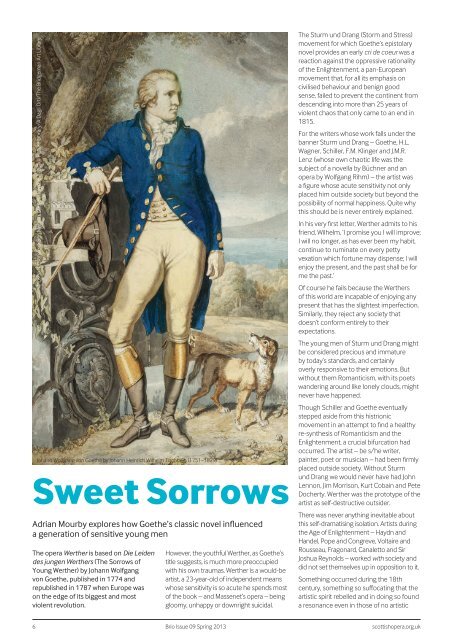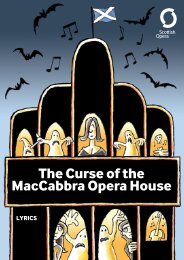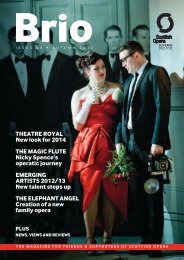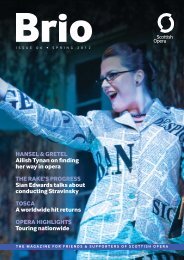issue 09. - Scottish Opera
issue 09. - Scottish Opera
issue 09. - Scottish Opera
You also want an ePaper? Increase the reach of your titles
YUMPU automatically turns print PDFs into web optimized ePapers that Google loves.
Museo Nazionale di San Martino, Naples, Italy/De Agostini Picture Library/A Dagli Orti/The Bridgeman Art Library.Johann Wolfgang von Goethe by Johann Heinrich Wilhelm Tischbein (1751–1829)Sweet SorrowsAdrian Mourby explores how Goethe’s classic novel influenceda generation of sensitive young menThe opera Werther is based on Die Leidendes jungen Werthers (The Sorrows ofYoung Werther) by Johann Wolfgangvon Goethe, published in 1774 andrepublished in 1787 when Europe wason the edge of its biggest and mostviolent revolution.However, the youthful Werther, as Goethe’stitle suggests, is much more preoccupiedwith his own traumas. Werther is a would-beartist, a 23-year-old of independent meanswhose sensitivity is so acute he spends mostof the book – and Massenet’s opera – beinggloomy, unhappy or downright suicidal.The Sturm und Drang (Storm and Stress)movement for which Goethe’s epistolarynovel provides an early cri de coeur was areaction against the oppressive rationalityof the Enlightenment, a pan-Europeanmovement that, for all its emphasis oncivilised behaviour and benign goodsense, failed to prevent the continent fromdescending into more than 25 years ofviolent chaos that only came to an end in1815.For the writers whose work falls under thebanner Sturm und Drang – Goethe, H.L.Wagner, Schiller, F.M. Klinger and J.M.R.Lenz (whose own chaotic life was thesubject of a novella by Büchner and anopera by Wolfgang Rihm) – the artist wasa figure whose acute sensitivity not onlyplaced him outside society but beyond thepossibility of normal happiness. Quite whythis should be is never entirely explained.In his very first letter, Werther admits to hisfriend, Wilhelm, ‘I promise you I will improve;I will no longer, as has ever been my habit,continue to ruminate on every pettyvexation which fortune may dispense; I willenjoy the present, and the past shall be forme the past.’Of course he fails because the Werthersof this world are incapable of enjoying anypresent that has the slightest imperfection.Similarly, they reject any society thatdoesn’t conform entirely to theirexpectations.The young men of Sturm und Drang mightbe considered precious and immatureby today’s standards, and certainlyoverly responsive to their emotions. Butwithout them Romanticism, with its poetswandering around like lonely clouds, mightnever have happened.Though Schiller and Goethe eventuallystepped aside from this histrionicmovement in an attempt to find a healthyre-synthesis of Romanticism and theEnlightenment, a crucial bifurcation hadoccurred. The artist – be s/he writer,painter, poet or musician – had been firmlyplaced outside society. Without Sturmund Drang we would never have had JohnLennon, Jim Morrison, Kurt Cobain and PeteDocherty. Werther was the prototype of theartist as self-destructive outsider.There was never anything inevitable aboutthis self-dramatising isolation. Artists duringthe Age of Enlightenment – Haydn andHandel, Pope and Congreve, Voltaire andRousseau, Fragonard, Canaletto and SirJoshua Reynolds – worked with society anddid not set themselves up in opposition to it.Something occurred during the 18thcentury, something so suffocating that theartistic spirit rebelled and in doing so founda resonance even in those of no artistic6 Brio Issue 09 Spring 2013 scottishopera.org.uk















